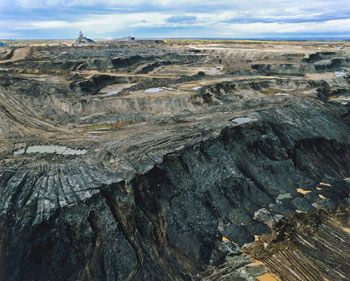Hopefully many of you remember Neil Young, a rock and roll legend.
He’s come out strongly against the Keystone tar sands pipeline. As a Canadian, he’s disgusted with tar sands production, which has transformed part of Canada into a "wasteland" that "looks like Hiroshima."
This used to be part of Canada’s Boreal Forest:

When he recently visited the region, Young found people sick and dying.
"People are sick. People are dying of cancer because of this. All of the First Nations peoples up there are threatened by this. "Their food supply is wasted, their treaties are no good. They have the right to live on the land, like they always did, but there’s no land left that they can live on. All the animals are dying."
When asked about all the jobs the pipeline would create, he said: "Yeah it’s going to put a lot of people to work, I’ve heard that, and I’ve seen a lot of people that would dig a hole that’s so deep that they couldn’t get out of it, and that’s a job too, and I think that’s the jobs that we are talking about there with the Keystone pipeline."
The fact is the pipeline is not a job creator anyway – just a couple thousand temporary jobs and a few dozen permanent jobs.
Another problem the pipeline would cause which we rarely – if ever – hear about is its impact on wildlife. Besides the climate impact of tar sands production and turning one of the world’s most important forests into a moonscape, the Department of Interior says the pipeline would have long-term, damaging effects on wildlife along its route.
Interior says, "Given that the project includes not only constructing a pipeline but also related infrastructure, access roads, and power lines and substations, impacts to wildlife will occur throughout the life of the project (i.e. operation and maintenance phases)." It will cause species displacement, increased predation rates and predator travel lanes, increased nest parasitism, vehicle collisions with wildlife … invasive plant species, increased wildfire risk, lower wildlife density, increase in collisions with power lines and electrocutions on power poles … and increase in poaching.’"
If that’s not enough, Interior also expressed concerns about Keystone’s contribution to noise, air, and light pollution along the route.

Young was speaking in Washington DC at a National Farmers Union event about the need to pass the Farm Bill. He also spoke about the importance of biofuels, criticizing the petroleum industry and some lawmakers for their efforts to dismantle the Renewable Fuel Standard. They are spreading misinformation about biofuels, he says.
Young drives what he calls a "LincVolt", a 1959 Lincoln Continental that’s been converted to run on a combination of electric and cellulosic biofuels.
While he believes cellulosic biofuels are important, he made a point of saying it needs to developed "sustainably" to ensure it actually cuts emissions.
"Ethanol and other biofuels and cellulosic ethanol and biodiesel are the answer, but we have to be careful how we grow it. We have to be as sustainable as can be and be regenerative and let the land breathe."

Neil Young has always been and will always be a hero to me.
GOD BLESS YOU, NEIL